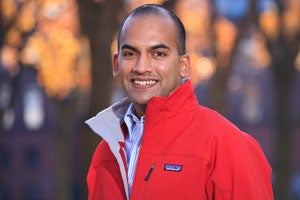For the first three months his battalion was stationed in Al Anbar Province in Iraq in early 2007, the situation was “highly kinetic,” recalls U.S. Marine Captain Siddhartha Velandy LL.M. ’11, with the Marines either under relentless attack or aggressively patrolling in order to create a secure environment.
“It was a violent place when we got there, and we were operating in just about as austere an environment as a battalion sized-element could be,” recalls Velandy, a 2003 graduate of the University of Connecticut Law School, who signed his military commitment as a 1L and did his basic training in Quantico, Va., the next summer, before returning to law school. “We didn’t have electricity or running water. It was just about as expeditionary as you can get.” With a broad smile, he adds, “It was just the type of place Marines would like to be. That’s by and large what Marines sign up to do; you go quickly to the toughest environments and persevere, accomplishing the mission no matter how difficult.”
His 1,000-Marine battalion suffered many casualties, says Velandy, who served as battalion executive officer, or second in command of the unit, while also serving as battalion judge advocate, advising the commander, Lieutenant Colonel James D. Christmas, on rules of engagement, targeting issues, detainee operations, and military justice matters. But once the Marines imposed order, they began governance work including helping to establish the rule of law by, among other things, working with the local city council to establish a court system and to nominate and confirm a local judge.
Velandy knows the exact moment he decided to become a Marine: during high school in Haddam, Conn., when military representatives addressed his class. The Army offered education benefits, the Navy promised recruits they’d see the world. “Then a Marine Corps gunnery sergeant stood up, and said, ‘We’ll give you three squares a day, and let you call yourself a Marine—if you make it.’ Chills went up back of my neck, and from that point, I wanted to be part of that organization.”
After graduating law school and passing the Connecticut and New York bars, Velandy returned to Quantico for 26 weeks of training at The Basic School, where all Marine officers, no matter whether a judge advocate, pilot, or infantry officer, learn the basic skills necessary to be a rifle platoon commander, including tactics, patrolling, all the organic weapon systems, and most importantly, leadership.
“There were a couple of other lawyers in my company, and we’d say, ‘I can’t believe we are paid to do this—to ride in helicopters or fire a heavy machine gun or just play in the woods,’” Velandy recalls. As a judge advocate, he next attended the Naval Justice School in Newport, R.I., before being assigned to Camp Lejeune in North Carolina, home of the Second Marine Expeditionary Force and, with 40,000 Marines, the largest Marine installation on the east coast.
His first eight months were spent on legal matters that arose on the base, such as use of military resources and ethics before he became base prosecutor, prosecuting crimes ranging from unauthorized absences and drug use to rapes. A frequent opposing counsel was Captain Courtney Walsh LL.M. ’11, against whom he tried about 80 cases, and whom he was delighted to learn was accepted to HLS for the same LL.M. class.
Velandy’s experience in Iraq confirmed his respect for the Marines. “My previous assignment as base prosecutor, I’d had all these cases dealing with the small percentage of Marines that do stupid things. That was all I saw,” he says. “Then to juxtapose that with this experience in a tremendous infantry battalion, to see what these 18- to 21-year-old Marines can do in that deployed environment was just awe-inspiring.” After eight months, Velandy’s battalion returned to the U.S., and he was assigned to the Pentagon, to the Office of Counsel for the commandant of the Marine Corps. The Commandant is the senior Marine officer and a member of the Joint Chiefs of Staff, and Velandy worked in an office that acted in a role similar to a general counsel to the CEO of a major corporation, advising on legal matters ranging from environmental issues, civilian personnel, ethics, and acquisitions. He served there until matriculating at HLS.
“The reason I chose HLS was the method of teaching here really gets into the foundations of legal questions,” says Velandy, calling it, “an opportunity I couldn’t really pass up.”
The General Counsel of Navy, Paul L. Oostburg Sanz ’99 offered Velandy advice for his year at HLS, including to choose courses for the professors rather than the subjects, to take at least one course out of his comfort zone, and to take a class at the Harvard Business School because, as Velandy recounts Sanz saying: “After you’re done with your service in the Marine Corps you’ll need a friend from the business school who’s now the CEO of a Fortune 500 company to give you a job.” Velandy laughs, and adds, “The other side of the general counsel’s sage advice is that it’s a completely different set of questions at the Business School, so, once again, that’s a broadening experience here at Harvard that’s perhaps not possible at other places.” (He’s taking Operations Strategy with Professor Robert Huckman.)
There are few students in the LL.M class who are from U.S. law schools, Velandy says, “so the global perspective is really terrific. If we military folks can offer in some small way our perspective to further the discussion, that’s just a tremendous opportunity and a privilege to be able to participate.”
Next: Courtney Walsh LL.M. ’11, U.S. Marine Corps, Captain »
